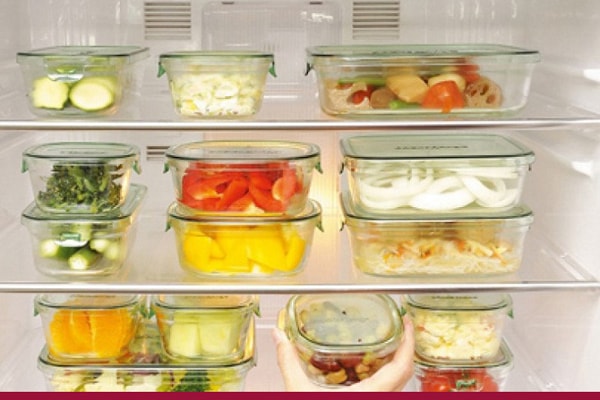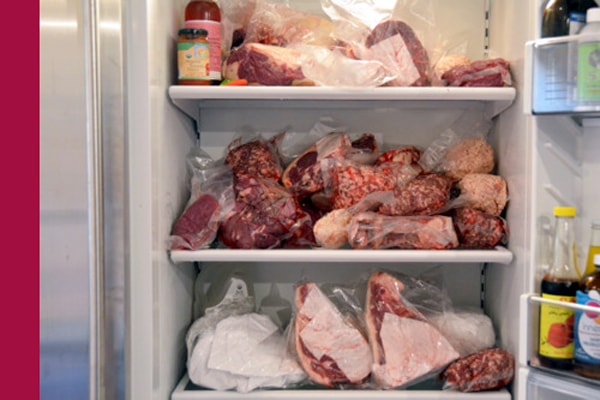The way of storing meat in the refrigerator is harmful to many households.
Meat and fish cannot be kept in the freezer forever, so how long is it appropriate to preserve them?
Vietnam is facing its most serious outbreak of African swine fever ever, with the disease spreading to 29 provinces and cities, forcing authorities to cull 1.2 million pigs.
Faced with the above information, millions of families are worried. Some boycott pork for fear of eating infected meat, while others increase their stockpiling of clean pork in the refrigerator to eat gradually.
Store frozen meat for only 2-3 weeks
Although not boycotting pork, to have a source of fresh meat, many families now regularly order clean pork products to store in the freezer to eat gradually within 1-2 months.
Many families even consider the refrigerator as a treasure, thinking that they can preserve food for as long as they want, so many families' refrigerators are always full of food stored day after day, month after month.
However, Dr. Nguyen Huy Thinh, food technology expert, emphasized that refrigerators only have the effect of temporarily stopping and slowing down the growth of bacteria, so even freezing does not mean permanent preservation.
Dr. Thinh said that if the government has a plan to build a national cold storage warehouse as proposed by the Ministry of Agriculture and Rural Development, with temperatures up to -50 degrees Celsius, pork can be preserved for 6 months to 1 year.
However, if the refrigerator is normal at home, with the lowest temperature of -12 to -18 degrees, the meat can be preserved for a maximum of 2-3 weeks. If left longer, the meat will lose its nutrients and will no longer be delicious.
According to Dr. Thinh, 2-3 weeks is applicable to good quality meat, freshly slaughtered meat, and fresh meat. If people buy meat that has been displayed at the market for many hours and has been contaminated with bacteria, the preservation time will be shorter.
Once the meat has been thawed, it should not be refrozen if it is not used up because when thawed, bacteria will grow again or be infected with new bacteria, affecting the quality of the food. In case of staphylococcus aureus infection when the meat is taken out, re-cooking it will still cause food poisoning.
Therefore, before storing, the meat should be divided into small pieces, then wrapped separately or stored in small boxes sufficient for each meal.
Besides defrosting in the microwave, Dr. Thinh recommends the simplest way to defrost is to put the frozen meat in the refrigerator half a day in advance or defrost it at room temperature a few hours in advance.
Improper storage makes the refrigerator a breeding ground for bacteria
With frozen food, if not properly stored in the refrigerator, it will be a breeding ground for bacteria due to cross-contamination.
Foods that have been pickled with salt, sugar, or vinegar, stored in sealed jars and refrigerated below 4 degrees Celsius can be preserved for a very long time.
However, with regular processed foods or vegetables and fruits, they should not be kept for more than 3 days.
 |
| Raw food should not be mixed with cooked food in the refrigerator compartment. Food in the refrigerator compartment should be stored in a sealed container with a lid. |
To store leftovers in the refrigerator, before putting them in the refrigerator, you need to reheat them to kill all bacteria, then let them cool, and store them separately in covered containers. Note that food containers need to be made of safe materials, especially plastic containers. Food that has been kept in the refrigerator must be reheated before eating, and cannot be eaten immediately.
For fruits and vegetables, it is necessary to wash them thoroughly before putting them in boxes or plastic bags. The safest way is to wash them several times under running water. According to a study by a group of scientists led by Kilonzo-Nthenge (USA) published in the Journal of Food Preservation in 2006, this is the cleanest way to wash fruits and vegetables, better than washing with 5% vinegar or 13% lemon juice.
Root vegetables and fruits such as bananas, apples, pears, mangoes, tomatoes, potatoes, sweet potatoes, etc. should not be kept in the refrigerator, just keep them in a cool place.
The refrigerator compartment is not evenly cold. The bottom compartment is colder than the top compartment. In the same compartment, the inside is colder than the outside, so perishable foods should be placed in the colder area.


